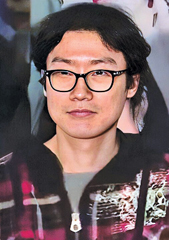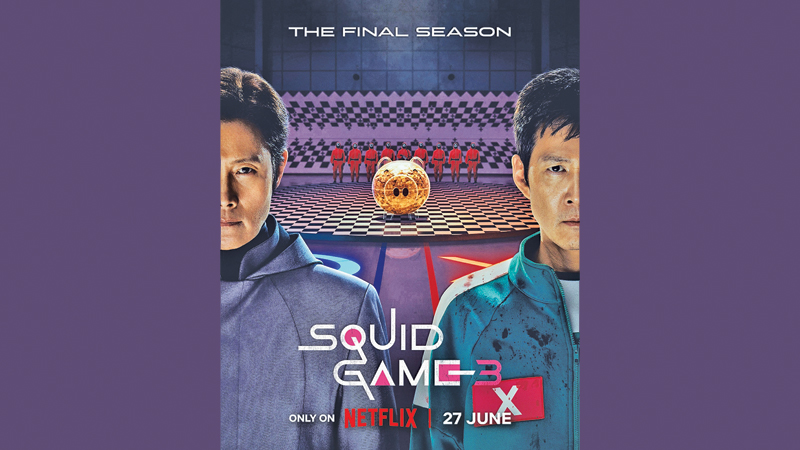 You probably saw my headline and thought “Oh boy”. But “Oh Boy” sounds right, and if you don’t want any spoilers, I suggest you move along to other juicy sections in this week’s Sunday Observer MUSE.
You probably saw my headline and thought “Oh boy”. But “Oh Boy” sounds right, and if you don’t want any spoilers, I suggest you move along to other juicy sections in this week’s Sunday Observer MUSE.
But if you have caught up with all three seasons of Squid Game, then congratulations – you win 45.6 billion Korean won (just kidding)!
Yeah, baby
Season 3 starts where Season 2 left off. Gi-Hun’s rebellion has been crushed by the overseer and he is back in his number 456 tracksuit, seemingly given up on convincing others to quit the game.
Lots of backstabbing, lots of revelations and lots of people voting ‘Yes’ to stay in the game. And then the pregnant woman, the former love interest of the crypto-bro character, delivers a baby in the middle of the game. Gi-Hun makes protecting this little baby girl his top priority. The rest of the suckers are still in the game. But Gi-Hun doubles down on beating the overseer and his billionaire clients (hello, Epstein‑adjacent VIPs).

Hwang Dong-hyuk
Long story short – Gi-Hun does his best while everybody straight up un-alives each other, the overseer’s Policeman bro doesn’t figure things out till the last minute and the sub-plot about the North Korean escapee/purple guard gets a happy ending. The baby is safe and sound – perhaps becoming South Korea’s youngest billionaire, and Cate Blanchet is slapping bums on the streets of Frisco hinting at a possible American Squid Game (bruh – America IS Squid Game).
Elephant in the room
Korean directors love their dystopias, and Squid Games is no different. But it wasn’t capitalism on the chopping block this time – it was democracy.
Unlike the previous Squid Game, the overseers give the participants a chance to vote if they choose to stay or leave after each round. And unlike Season One where participants vote to leave after playing a the first bloody game of ‘Red Light, Green Light’, the new lot in Season Two and Three vote to stay in the game (in clear majorities and overwhelming majorities later in the game).
The most disgusting part comes at the end when the remaining contestants vote to kill the baby. The baby’s father, the crypto bro, masks his paternity till the end when it’s most convenient but Gi-Hun sees through his malignant intentions. I thought for a second that Mr. 456 would throw himself off the platform to give the kid and the dad a chance to patch up their lives with the 45.6 billion, but I was wrong.
Transcendent
Fans also fell in love with the transgender character Cho Hyun-ju – ex-special forces soldier who is playing the game to get money for their gender-affirming surgery. Hyun-ju shatters ‘fogey’ and ‘woke’ stereotypes by exhibiting both their vulnerable and valiant sides.
There’s a new wave of conscious directors who are showing LGBTQ+ characters as complex, fully human individuals—not political props. ITN’s 2023 crime drama ‘Kodi Gaha Yata’ also featured a queer gangster — raw, real, and unfiltered.
Hollywood’s taken flak for shoehorning DEI characters into stories. But characters like Kalu (Kodi Gaha Yata) and Cho Hyun-ju (Squid Game) show how it’s done: with depth, honesty, and without a lecture.
Confucius vs. Liberal Democracy
Personally, I paid close attention to Gi-Hun’s development from naïve, dolgona-licking idiot into a wise, brooding everyman hero who re-joins the game to set the record straight; kudos to Lee Jung-jae for portraying this epic transformation, notwithstanding the Olympiad between Season 1 and Season 2-3.
For me, Gi-Hun’s transformation represents the Confucian concept of ‘self-cultivation’. Confucianism emphasises the continuous process of personal and moral improvement to become a better individual and contribute to a harmonious society. It involves a range of practices and attitudes aimed at developing virtues, regulating emotions, and fostering positive relationships.
In Mr. 456’s case it was the process of morally transforming oneself to align with the ‘Way’ (Dao) and become a better person and ‘humanity/benevolence’ (Ren): the foundational virtue of Confucianism, emphasising empathy, compassion, and concern for others.
The democracy that plays throughout Season 2 and 3 is in stark contrast to Gi Hun. Today’s news is rife with democratic disappointments and the Donald Trump administration’s U-turn from releasing the Epstein list and not involving the US in foreign conflicts are just two examples.
Chinese philosopher Zhao Tingyang perfectly dissects the failings of liberal democracy in a 2024 interview: “A weak point of democracy is its ambiguous conceptualisation: never exclusively defined and thus open to interpretations. This vague physiognomy allows everything to disguise itself as democracy and thereby claim its justification; and so, many democratic “Trojan horses” arise”.
Zhao continues: “Now, the worst of all: pseudo-democracy is found to be a true twin of democracy, with the same gene. The agora, where democracy was developed, was also a market. A market of opinions is close to a market of commodities; if more people choose apples, then clearly apples are more welcome.
Similarly, if more voters support Trump, then Trump seems justified. Many will not recognise this, but it is awkward due to the lack of a robust democratic reasoning. Market and democracy share the same basic rules. Unfortunately, the majority principle does not always speak truth or goodness; and more unfortunately, there are many ways and opportunities for the political, financial, and media powers to mislead and manipulate people’s choices. Powers are smart; they know the best strategies.
In the modern condition of the rule of law as well as under the rule of the market, more powers develop the strategy of reshaping or remaking the public’s mind by selling illusions to the people and thereby creating one common mind. So, we see “publicracy” rather than democracy; or publicracy in the appearance of democracy; or distorted democracy overlaid upon publicracy. That is the “Trojan horse” that undermines democracy”.
So, were the contestants in the end right to vote to kill the baby? Remember that the father of the child was also among the group, incognito, when this evil decision was made. In their own heads perhaps they had all the right to live. They were going to walk away unscathed by making the sacrifice. But when the last round starts, the overseers had a different game in mind: only one of them was going to win that 45.6 billion and their “polling” transformed into casting lots and then on to a barbaric struggle to survive (and win).
But it’s not just me raising my eyebrows about Squid Game’s jibe on democracy. Salon warned of Squid Game’s tribalism allegory and in a Los Angeles Times article in June, series creator Hwang Dong-hyuk said: “In the past, at the time of elections, despite our differences, we all came together; there was more tolerance through the process of conflict,” Hwang said.
“I don’t think that is anymore the case. Rather, elections (have only driven) societies into greater divides. I wanted to explore those themes in Seasons 2 and 3; that’s why I included the voting in each round.”









